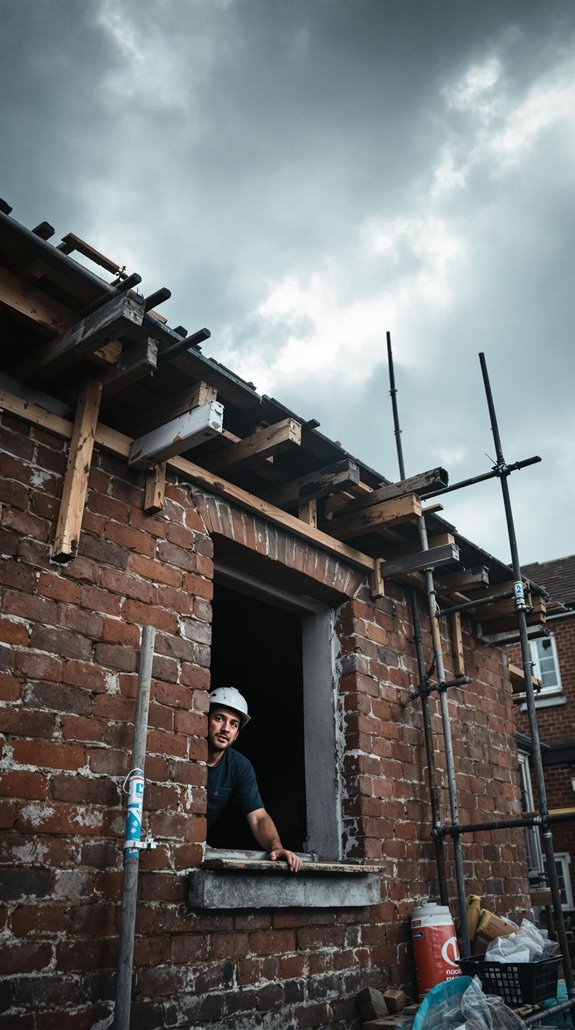I’ve seen countless homeowners discover too late that their standard home insurance won’t cover major renovation work. When you’re planning structural changes, extensions, or significant refurbishments, your existing policy typically becomes void or severely limited. This leaves you exposed to substantial financial risks that could devastate your project budget and personal finances. The solution isn’t straightforward, and there’s specific coverage you’ll need to secure before lifting a single floorboard.
Key Takeaways
- Standard home insurance doesn’t cover major renovation projects, requiring specialized renovation insurance for structural changes and vacant properties.
- Essential coverage includes buildings protection (£1M minimum), contents replacement, liability coverage (£2M+), and alternative accommodation costs.
- Policy options range from £20,000 basic coverage to £10M packages with flexible 3-36 month durations based on project scope.
- Pre-renovation compliance requires EPC assessments, asbestos surveys, structural engineer reports, and Party Wall Agreements where applicable.
- Inadequate coverage risks include escape of water damage, structural accident costs, policy invalidation, and potential mortgage breaches.
When Property Renovation Insurance Becomes Essential
While standard home insurance covers everyday risks like fire and theft, it won’t protect you during major renovation projects. I need to help you understand when your existing policy becomes inadequate.
Your standard insurance becomes invalid when you’re undertaking structural changes like removing load-bearing walls, foundation work, or roof replacement. These aren’t cosmetic updates – they’re major alterations that insurers won’t cover.
If your property remains vacant for 30+ days during works, you’ll lose standard protections entirely. Your mortgage lender requires continuous coverage even when the property’s uninhabitable, so you can’t simply let insurance lapse. Many renovation projects exceed initial estimates, making extended coverage periods essential for protecting your investment.
When contractors are on-site, you face increased public liability risks. High-value projects exceeding £300,000 or lasting beyond three months need specialized coverage that standard policies simply can’t provide.
Core Coverage Components You Must Understand
Property renovation insurance isn’t a single monolithic policy – it’s a carefully structured framework of interconnected coverage components that work together to protect your investment. I’ll break down what you need to understand about each essential element.
Buildings cover forms your foundation, protecting your main structure, attached garages, and permanent outdoor features with minimum £1 million coverage. Contents cover safeguards your belongings on a new-for-old replacement basis, starting from £25,000.
Liability protections are vital – you’ll need £2 million+ for property owners’ liability and public liability coverage for contractors. Alternative accommodation covers temporary housing costs up to £75,000 for buildings claims.
Specific event coverage handles “wide perils” like fire, storm, flood, and theft, plus home emergencies up to £500. Standard Homeprotect policies automatically include renovation coverage for projects under £20,000, while larger renovations require policy updates to ensure adequate protection.
Additional Policy Options Worth Considering

Beyond the essential coverage components, several specialized policy options can greatly enhance your renovation insurance protection. I’ve found that renovation insurance is specifically designed for homeowners, contractors, and property owners undertaking building projects, offering targeted coverage that standard policies can’t match.
You’ll want to evaluate coverage tiers based on your project’s value – from basic policies covering renovations under £20,000 to specialist packages for projects up to £10 million. Flexible policy durations ranging from 3-36 months guarantee you’re not overpaying for unused coverage time.
Higher public liability limits (up to £5 million) protect against third-party claims, while non-negligent liability options cover damage you didn’t directly cause. Additional coverages like contents protection, plant equipment, and loss of rent provide thorough project security.
Many property owners remain completely unaware of the specialist insurance requirements for renovation projects, often assuming their standard home insurance will provide adequate protection during construction work.
Pre-Renovation Compliance Requirements
Before launching your renovation project, you’ll need to navigate a complex web of compliance requirements that can make or break your timeline and budget. I’ll guide you through the essential pre-work documentation that’ll keep you on the right side of regulations.
First, you’ll need an Energy Performance Certificate (EPC) assessment before any energy-related renovations begin. For properties built before 1980, asbestos surveys are compulsory before demolition or structural work starts. If you’re modifying load-bearing walls or foundations, structural engineer reports become mandatory, especially if the changes affect building control approval for the overall safety of the project.
Don’t overlook Party Wall Agreements for shared boundary works—you’ll need minimum two-month notice periods. For extensions exceeding 5% of your original footprint, drainage assessments are required. Additionally, ensure your renovation plans align with the updated Building Regulations Parts F and L, which introduced new ventilation standards and energy efficiency performance targets in 2022. Missing these steps risks costly delays and enforcement actions.
Risks of Inadequate Insurance Coverage

When renovation work begins, your standard home insurance policy becomes dangerously inadequate for the risks you’ll face. I’ve seen countless homeowners discover too late that their policies exclude coverage for structural work, theft of contractor materials, and damage to neighboring properties. Additionally, if you plan to rent out the property post-renovation, you’ll need to consider landlord licensing requirements to ensure compliance with local regulations.
You’re particularly vulnerable to escape of water incidents from exposed pipes—the leading cause of renovation claims. Standard policies often become invalid when you don’t disclose renovations as “material facts,” leaving you completely unprotected. Accidental structural damage accounts for 29% of renovation claim costs, yet most policies exclude this coverage.
Without proper insurance, you’ll face mortgage agreement breaches, unrecoverable losses, and potential legal penalties for non-compliance with unoccupied property regulations. If your property becomes uninhabitable for extended periods, you’ll need unoccupied property insurance to maintain coverage. Don’t assume your existing policy covers renovation risks—it doesn’t.
Conclusion
I can’t stress enough how critical proper renovation insurance is for your project’s success. Don’t assume your standard policy covers structural work—it won’t. You’ll need specialized coverage that protects against construction risks, liability claims, and compliance failures. Get your EPC and asbestos surveys done before starting, and make certain you’re fully covered for buildings, contents, and alternative accommodation. The financial consequences of inadequate insurance can devastate your renovation budget and personal finances.
References
- https://resi.co.uk/advice/general/a-guide-to-renovation-insurance
- https://www.cover4letproperty.co.uk/what-is-renovation-insurance/
- https://www.hollandgreen.co.uk/news/do-you-need-building-insurance-for-a-renovation-project/
- https://www.dualinsurance.com/uk-en/products/construction/renovation
- https://www.saga.co.uk/home-insurance/home-renovation-insurance
- https://www.biba.org.uk/insurance-guides/home-insurance-guides/home-renovation/
- https://www.lloydwhyte.com/advice-zone/altering-or-updating-your-house-dont-assume-your-insurance-will-cover-you/
- https://www.homeprotect.co.uk/renovation-insurance
- https://www.alanboswell.com/personal-insurance/home-property-insurance/home-renovation-insurance/
- https://www.hadenwelbeck.co.uk/renovating-your-home-how-to-protect-your-property-during-renovations/

